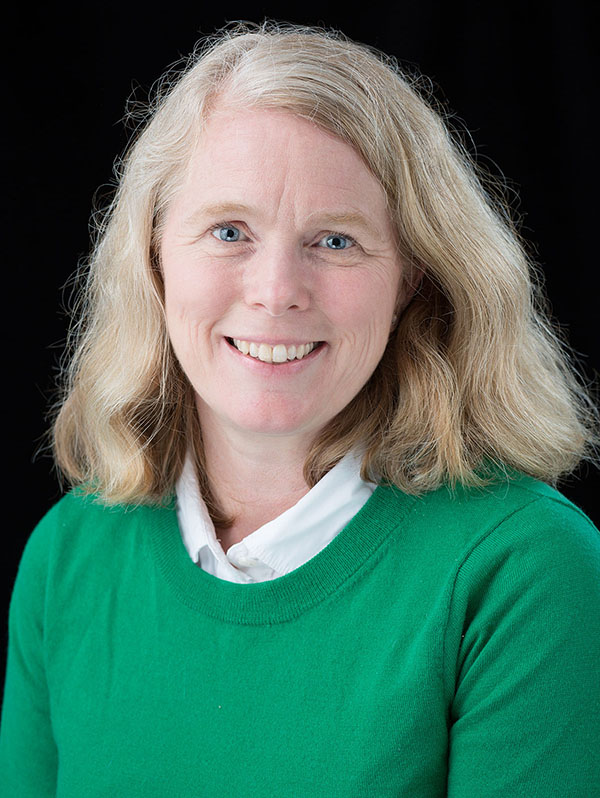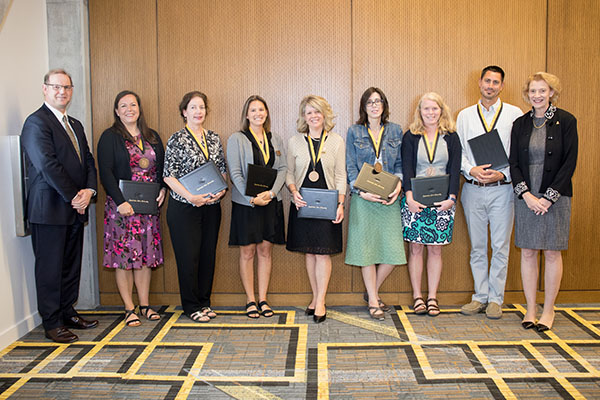When Appalachian State University professor Dr. Leslie Bradbury wants to excite student teachers about the possibilities in teaching science, she stands on her head and drinks a glass of water.
The exercise provides a lesson in how the digestive system works, and a lesson in how to ignite a classroom over science concepts.
“If I’m saying to student teachers, ‘Kids learn best by getting to have experimentation with investigations,’ and I don’t model that, how are they ever going to learn how to do it?” Bradbury said.
Bradbury, a professor in the Department of Curriculum and Instruction in the Reich College of Education, was recently honored with an award for excellence in teaching at the Fall Semester Faculty and Staff Meeting. She came to Appalachian in 2005, where her area of specialty is science education.
She was attracted to Appalachian for its reputation as a great place for training teachers, Bradbury said.
“The people here are passionate about excellent teaching,” she said. “It’s a very friendly place. We have conversations about what we’re doing in our classes and how we can improve and collaborate.”
Bradbury has always loved science. She received her Bachelor of Science in biology from James Madison University, a master’s in science education from East Carolina University and a doctorate in science education from the University of Georgia.
“I think science applies to everything in our lives, whether it’s the weather, our health or the world around us – all of it is science,” she said. “I think it makes it more exciting when we can understand why it works.”
Scavenger hunts, balloon rockets and more
Teaching science can be intimidating to young teachers, Bradbury said. With the focus on testing math and reading, many elementary schools aren’t spending as much time on science instruction as they did a generation ago.
“They’ve [student teachers] heard that the days are longer in the summer and shorter in the winter, but they don’t necessarily understand why that’s the case,” she said. “We use models with globes and flashlights and simulations to help them understand.”
She’ll send her student teachers outside on a scavenger hunt to find the ways rocks are used in daily life, or have them launch balloon rockets to understand forces and motion.
Haleigh Lowery, a senior elementary education major from Charlotte, said she’s become more confident about teaching science since taking Bradbury’s classes.
“Having her as a teacher has made me realize how much fun being a teacher can be,” Lowery said. “She has helped me to realize how important teaching science is, as well as how easy is to integrate other content areas into a science lesson.”
Partnerships with public school teachers in the Boone area provide a perfect laboratory for Bradbury and her students to try out their ideas for teaching science. Every Friday during their last semester before student teaching, her students are in local elementary schools observing and working with elementary teachers on teaching science concepts from lessons they’ve planned.
“I can say, ‘That seems like a really great idea. Let’s see how we can tweak it so it can actually work with second graders,’” she said.
What do you think?
Share your feedback on this story.
About the Reich College of Education
Appalachian State University offers one of the largest undergraduate teacher preparation programs in North Carolina, graduating about 500 teachers a year. The Reich College of Education enrolls more than 2,000 students in its bachelor’s, master’s, education specialist and doctoral degree programs, with offerings that span multiple fields — from teacher preparation, counseling, and therapy, to higher education, school and student affairs administration, library science, educational leadership and more. With over 10,000 alumni employed in North Carolina public schools, there is at least one Reich College graduate in every county in the state. Learn more at https://rcoe.appstate.edu.
About Appalachian State University
As a premier public institution, Appalachian State University prepares students to lead purposeful lives. App State is one of 17 campuses in the University of North Carolina System, with a national reputation for innovative teaching and opening access to a high-quality, cost-effective education. The university enrolls more than 21,000 students, has a low student-to-faculty ratio and offers more than 150 undergraduate and 80 graduate majors at its Boone and Hickory campuses and through App State Online. Learn more at https://www.appstate.edu.






![How NCInnovation Is Rethinking Economic Development in North Carolina [faculty featured]](/_images/_posts/2026/02/rethinking-economic-development-600x400.jpg)







